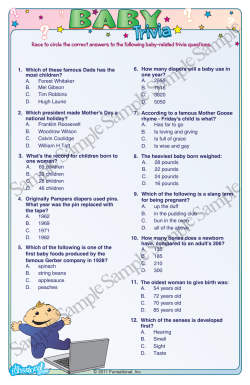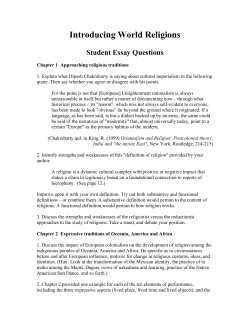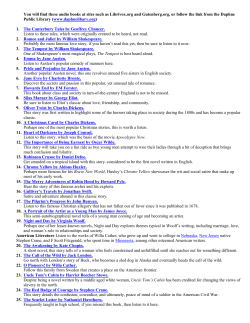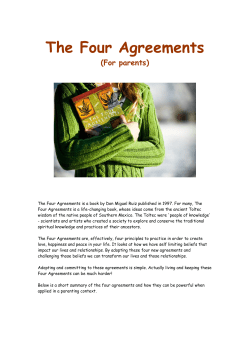
Alain de Botton : The News – a User’s Manual
Alain de Botton : The News – a User’s Manual Hamish Hamilton 2014 Notes Alison Morgan, April 2014 Cover reminiscent of Bible, with red letter text inside… Bold print for emphasis is mine. Italics are summary of the content, normal print is extracts. PREFACE IT DOESN'T COME with any instructions, because it's meant to be the most normal, easy, obvious and unremarkable activity in the world, like breathing or blinking. After an interval, usually no longer than a night (and often far less; if we're feeling particularly restless, we might only manage ten or fifteen minutes), we interrupt whatever we are doing in order to check the news. We put our lives on hold in the expectation of receiving yet another dose of critical information about all the most significant achievements, catastrophes, crimes, epidemics and romantic complications to have befallen mankind anywhere around the planet since we last had a look. What follows is an exercise in trying to make this ubiquitous and familiar habit seem a lot weirder and rather more hazardous than it does at present. THE NEWS IS committed to laying before us whatever is supposed to be most unusual and important in the world: a snowfall in the tropics; a love child for the president; a set of conjoined twins. Yet for all its determined pursuit of the anomalous, the one thing the news skilfully avoids training its eye on is itself, and the predominant position it has achieved in our lives. 'Half of Humanity Daily Spellbound by the News' is a headline we are never likely to see from organizations otherwise devoted to the remarkable and the noteworthy, the corrupt and the shocking. Societies become modern, the philosopher Hegel suggested, when news replaces religion as our central source of guidance and our touchstone of authority. In the developed economies, the news now occupies a position of power at least equal to that formerly enjoyed by the faiths. Dispatches track the canonical hours with uncanny precision: matins have been transubstantiated into the breakfast bulletin, vespers into the evening report. But the news doesn't just follow a quasi-religious timetable. It also demands that we approach it with some of the same deferential expectations we would once have harboured of the faiths. Here, too, we hope to receive revelations, learn who is good and bad, fathom suffering and understand the unfolding logic of existence. And here too, if we refuse to take part in the rituals, there could be imputations of heresy. The news knows how to render its own mechanics almost invisible and therefore hard to question. It speaks to us in a natural unaccented voice, without reference to its own assumption-laden perspective. It fails to disclose that it does not merely report on the world, but is instead constantly at work crafting a new planet in our minds in line with its own often highly distinctive priorities. As revolutionaries well know, if you want to change the mentality of a country, you don’t head to the art gallery, the department of education or the homes of famous novelists; you drive the tanks straight to the never centre of the body politic, the news HQ. 12 Why do we keep checking the news? Dread – we know how much is liable to go wrong and how fast. In the immediate vicinity there may well be peace (birds singing in the garden, dust gathering on the bookshelves) – but we are aware that such serenity does not do justice to the chaotic and violent fundamentals of existence – so it grows worrisome. Also perhaps because it provides relief from the claustrophobic burden of living with ourselves, persuading other people to take us seriously. To ask why the news matters is not to presume that it doesn’t, but to suggest the rewards of approaching our intake more self-consciously. POLITICS Many headlines are simply boring. ‘Tenants rent arrears soar in benefits pilot scheme.’ Suppose it was an extract from Anna Karenina – that’d be boring too. But that’s what it is – the news randomly dips readers inot a brief moment in a lengthy narrative and then pulls them out again, without offering any explanation of the wider context. News organisations present us each day with minuscule extracts of narratives whose true shape and logic can only emerge from a perspective of months or even years. The implication is that it’s better to have shaky, partial grasp of a subject NOW than to wait for a more secure understanding further down the line. We need the larger headings, signposts – otherwise we just shelve the info, we have nowhere to put it. Eg ‘bus shelter graffitied by vandals’ belongs under the heading ‘the difficulties faced by liberal secular societies trying to instil moral behaviour without the help of religion.’ Most news organisations however claim to present neutral facts, dispassionately; they do not presume to tell us what the facts actually mean. The difference between the news and religions is that religions know they can’t tell us too much in one go or we switch off – they focus on repetition and rehearsal, slow us down. What kind of country do we live in? We don’t know, based on our own local experience. Our impressions are formed using two tools – architecture and the news. The nes is usually bad, and it colours our views. Things become harder – people are violent, hospitals poor, the world corrupt, dangers abound. The news claims to give us the facts – a father actually did murder his baby. And yet it’s not true – because millions of others didn’t. We don’t get headlines like ‘grandmother helped up stairs by stranger’. So the news acquires the power to assemble the picture that citizens end up having of each other; the power to invent a nation. It focusses on the darkness – to prevent the nation from lapsing back into the tendency to gloss over its problems and feel foolishly content with itself? The news needs to be invited also to train and direct our capacities for pride, resilience and hope. National decline can be precipitated not only or principally by sentimental optimism, but also by a version of media-induced clinical depression. 45. As we spend time with the news we will become well acquainted with fear and anger. Our chances of surviving the difficulties facing humanity are deemed to be very slim – though slightly increased if we habitually keep up with the headlines. 49 In stoking our fears, the news exploits our weak hold on a sense of perspective. We are frightened by stories of disaster, angered by ones about the budget, the deadlock. The news proves we are ruled by crooks and idiots. In hock to the excitements and commercial advantages of rage, the news cruelly ignores the project of consolation. 55 Flaubert hated newspapers because eh thought they encouraged readers to hand over to others a task they should do themselves – form complex and intelligent opinions. Here was a homogenizing force in danger of stamping out all the productive oddities of interior life and of turning the rich, idiosyncratic, handcrafted kitchen gardens of the mind into rolling, mechanized, insipid wheatfields. 69. He kept an encylopedie de la betise humaine – with entries such as ‘Budget – never balanced. Christianity – freed the slaves. Exercise - prevents all illness.’ Not hard to come up with equivalents today! News stories tend to frame issues in such a way as to reduce our will or even capacity to imagine them in profoundly other ways. Through its intimidating power, news numbs. Without anyone particularly rooting for this outcome, more tentative but potentially important private thoughts get crushed. 74. They need ideas which will be generally embraced – subtleties don’t sell in large numbers. WORLD NEWS News organisations are unexpectedly idealistic – the idea is that by exposing the world’s ills, they can be eliminated. And yet – 6m people read the BBC article on the Duchess of Cambridge’s pregnancy, and 4500 read about the humanitarian crisis in East DRC. We have instant access to info about events in every nation on earth – but we aren’t particularly interested. It’s not that we are ignorant and need informing, it’s that we are indifferent. Journalists prioritise the unusual, the terrible, bloody and murderous – so torture by the security services trumps the nature of a bucolic lifestyle by the River Jordan. But if we don’t know about the normal, we won’t be interested in the abnormal. We won’t identify. Further, they focus on state and business – military, commercial and humanitarian concerns. We don’t really want to know where to fight, trade or offer sympathy; we want to understand, identify, relate. Why do we attend Shakespeare’s Julius Caesar – not because of the politics, but because it’s about us. We read travel literature because we travel with the companionship of the narrator – but journalists seek to be objective, impersonal. It ain’t the facts, it’s the relationships, experiences which we are interested in. We need not just the info about the theft of money from the Ugandan prime minister’s office, we need the smell of mango trees after the rains. William Carlos Williams: It is difficult to get the news from poems yet men die miserably every day for lack of what is found there. The news rarely brings life. News photography – most corroboration, there to break up the text. Occasionally, revelation – advances our understanding and challenges the clichés. ECONOMICS We are the inheritors of an idea, endorse by both the right and the left wings of the political spectrum, that the most fundamental reality of nations is their financial state – and that economic reporting should therefore be recognized as the most important facet of all news output. 127. To assess a nation through its economic data is a little like re-envisaging oneself via the results of a blood test, whereby the traditional markers of personality and character are set aside and it is made clear that one is at base, where it really counts, a creatinine level of 3.2, a lactate dehydrogenase of 927, a leukocyte (per field) of 2 and a C-reactive protein of 4.2. p128. CELEBRITY THE NEWS CONSTANTLY introduces us to a parade of extraordinary men and women: people who can run faster than anyone else on earth, who know how to make us laugh, who have started revolutionary businesses, who can design succulent meals and whose faces are flawlessly beautiful. Their achievements, personalities and good looks excite us as few other things can. As a result, we often want to ask them how they did it, hear them talk about their childhoods, observe what they are wearing, find out whom they are in love with, peek inside their homes, follow them to the seaside and even accompany them across the road when they go out to buy groceries. 157 The instinct to admire is an ineradicable and important feature of our personalities. But we should channel it – to focus on the people who embody the highest, nobles and most valuable beneficial values. Ancient Athens celebrated sporting prowess, Catholics celebrate saints – encouraging us to improve, to strive for better. We need to locate celebrities who can function as guides to virtues we need to bolster in ourselves. Not publish photos of Emma Watson buying strawberries, or ask Usain Bolt how many times he has been in love… Often we are so fed stories of success and celebrity that we despair of ourselves – repeated evidence of the accomplishments of humanity’s most energetic and inventive members fills us with envy and discontent. Why do people want to become famous? The longing to be treated nicely… Fame is the opposite of being overlooked, patronised, humiliated. But the appetite for fame depends on your childhood and the society you live in. Most famous people experienced early rejection. The happily anonymous adult is the lucky one, the one who has received the sense of being central in the affections and care of a parental figure. A decade of parental love can give a person strength enough to cope with fifty years of insignificance. The only childhood properly deserving of the epithet ‘privileged’ is one in which the child’s emotional needs were adequately met. P180. How good a job have we done parenting our own children? The litmus test is, do they have any wish to become famous? A society where everyone wants to be famous is also one where.. being ordinary has failed to deliver the degree of respect necessary to satisfy people’s natural appetite for dignity. 180 Famous people dream of securing high grade attention. But what they get is love followed by hatred, a focus on their lapses. They get hurt – just like you and me. Why are we interested – because we are furious about our own lack of attention, so we punish those who seem to have deprived us of our due. It’s jealousy. DISASTER Greek tragedies focussed on the most awful human disasters and perversions – they were resources, Aristotle said, for the emotional and moral education of a whole society. We discover that the supposedly monstrous protagonist is, in fact, rather like us. Tragedy’s task was to demonstrate the ease with which an essentially decent and likeable person could end up generating hell. Might I be capable of killing my partner? We need the answer to be no – and tragedy helps us practice not doing the things that we might under extreme circumstances be attracted to exploring. The news, however, is a lot nastier. Compare Oedipus Rex, with the commentary of the chorus helping us understand Oedipus’ struggles and motivations, with a paragraph about a doctor downloading child porn. We roundly condemn, and move on – we learn nothing. Accident reporting reminds us that humanity suffers – not just us. It restores meaning to our lives by reminding us of our fragility. TO LIVE IN modernity - an era contemporaneous with the triumph of the news is to be constantly reminded that, thanks to science and technology, change and improvement are continuous and relentless. This is part of the reason we must keep checking the news in the first place: we might at any moment be informed of some extraordinary development that will fundamentally alter reality. Time is an arrow following a precarious, rapid and yet tantalizingly upward trajectory In pre-modern societies, by contrast, people thought of time as a wheel. Life was ineluctably cyclical. The most important truths were recurring; the cycle could not be avoided or broken. Even if having regular access to news had been technologically possible, it wouldn't have been very psychologically necessary. Societies that see time as a wheel rather than an arrow feel no pressing need to check the headlines every quarter of an hour. 219-220 WE ARE MORE impatient - and optimistic about the future. The underlying, unmentioned promise of health news is that science might one day discover a cure for everything, death included. It might be simpler if this unspoken claim were categorically untrue. The reality is more complicated. We will one day, perhaps in 780 years' time, crack the mysteries of ageing and disease. But it will be too late for you and me. The fundamentals of our lives are fated to adhere to the same cycle known to all our ancestors. Despite its general interest in the macabre, the news refuses to be grim or dark enough in its reporting on 'health'-related matters. It continues to treat the latest findings about red wine, gene therapy and the benefits of eating walnuts with a superstitious reverence not dissimilar to that which might once have inspired a devout Catholic pilgrim to touch the shin bone of Mary Magdalene - in the hope of thereby securing ongoing divine protection. Rather than face up squarely to the unqualified inevitability of decay, the news prefers to flog the newly discovered health advantages of drinking grapefruit juice and wearing tight cotton socks on long-haul plane journeys. Amidst its appetite for murders and explosions, the news remains unhelpfully squeamish with regard to ordinary mortality. Its proclivity for turning death into a climactic spectacle dissuades us from accepting it as a daily reality. We are whisked from the bomb site to the smouldering plane crash; we are rarely shown the everyday business of an octogenarian heart giving out. Before they were displaced in our consciousness by the news, religions placed the task of preparing us for death at the heart of their collective missions. The needs and fears that we once brought to our places of worship have not disappeared in the secular age: we remain tormented by anxiety and a longing for comfort in relation to mortality. But these emotions receive little public acknowledgement, being left instead to haunt us in the small hours, while in the more practical and functional parts of the day the news keeps drawing our attention, with deranged zeal, to the newly discovered, anticarcinogenic properties of blueberries and a daily teaspoonful of walnut oil. 220-221 CONSUMPTION There is a lot of disapproval about consumerism – but the news has a role to play in helping us ensure that our acts of consumption proceed as well as they possibly can. So journalists research, test and assess products. These are surely important matters, yet to restrict consumer news to such practical investigations is to overlook a key feature of why we are motivated to buy certain things in the first place. The kinds of purchases surveyed in the news generally sit well beyond necessity. In acquiring them, what we are after is rarely solely or even chiefly just material satisfaction; we are also guided by a deeper, often unconscious desire for some form of psychological transformation. We don't only want to own things; we want to be changed through our ownership of them. Once we examine consumer behaviour with sufficient attention and generosity, it becomes clear that we aren't indelibly materialistic at all. What makes our age distinctive is our ambition to try to accomplish a variety of complex psychological goals via the acquisition of material goods. 227 Material objects are promises of, and enticements to, future states of mind; they provide us with idealized images of where we want to get to. The diminutive Italian city car speaks of a winning cheekiness and playfulness, the titanium desk lamp hints at a busy life reduced to its meaningful essence, the mountain hiking holiday promises an end to hesitancy and fragility and the birth of a new and more resilient self. 230 Religions understand this – they know particular foods, clothes, travels and items of interior decoration shape character and influence people in spiritual ways – eg Zen Buddhism advises adherents to own simple and beautiful pots. It may work today – a new coat may make us feel more confident. But it won’t work simply through the act of purchase. In an ideal consumer news section there would be headings like Confidence and Calm, presenting us with a range of both conceptual and material options. BECAUSE WE HAVE allowed ourselves to divorce consumption from our deeper needs, our purchases have become unsupportive of our psyches. Just as consumer news has helped to create this schism, it can also help to rectify it, for it is in large measure the media that informs our notions of what we should be buying, and to what end. The categories, language, positioning and cues it uses when presenting options for purchase possess an extraordinary power to influence what we feel we must own and do. By changing something as apparently minor as the categories in which consumer news reports its findings, by focusing on genuine needs rather than inchoate desires, we might start to do proper justice to the underlying aspirations generated by consumer goods - goods that we exhaust ourselves and our planet to make and pay for. We thereby stand a chance of becoming truer versions of what consumer news has always wanted us to be: happy shoppers. 232 CONCLUSION We can now personalise the news. Good if we had a mature sense of what news we need to hear. So, what should the news be? Political news should interest us in the complex mechanics of our societies, help us to agitate for their reform and enable us to accept their limitations. World news should open our eyes to the nature of life in other countries, giving us rich, sensory and personal portraits of other nations. Economic news should investigate workable approaches which could effect saner versions of market capitalism, and represent more than cold economic data when representing business activities. Celebrity news should introduce us to the most admirable people of our era, and guide us to learn from them. Disaster news should remind us how close we are to behaving in amoral or violent ways ourselves, and encourage us to greet with gratitude every pain free hour. Consumer news should teach us how complicated it is to generate happiness by spending money. Warnings: We run to the news when feeling edgy and inclined to escape ourselves – we willingly give up all responsibilities to ourselves in order to hear of such large and pressing issues as Brazil’s debt, Australia’s new leader, child mortality rates in Benin, deforestation in Siberia and a triple murder in Cleveland. The news machine can crush our capacity for independent thought It is an adversary of inner examination – it eliminates introspection; we will have nothing substantial to offer anyone else so long as we have not first mastered the art of being patient midwives to our own thoughts. 353 We can’t find everything we need to round out our humanity in the present We need relief from the impression that we are living in an age of unparalleled importance We should forgo our own news in order to pick up on the stranger, more wondrous headlines of kestrels and snow geese, lemurs and small children – a flourishing life requires a capacity to recognize the times when the news no longer has anything original or important to teach us; periods when we should refuse imaginative connection with strangers, when we must leave the business of governing, triumphing, failing, creating or killing to others, in the knowledge that we have our own objectives to honour in the brief time still allotted to us. 255 Alison Morgan www.alisonmorgan.co.uk www.resource-arm.net
© Copyright 2025





















